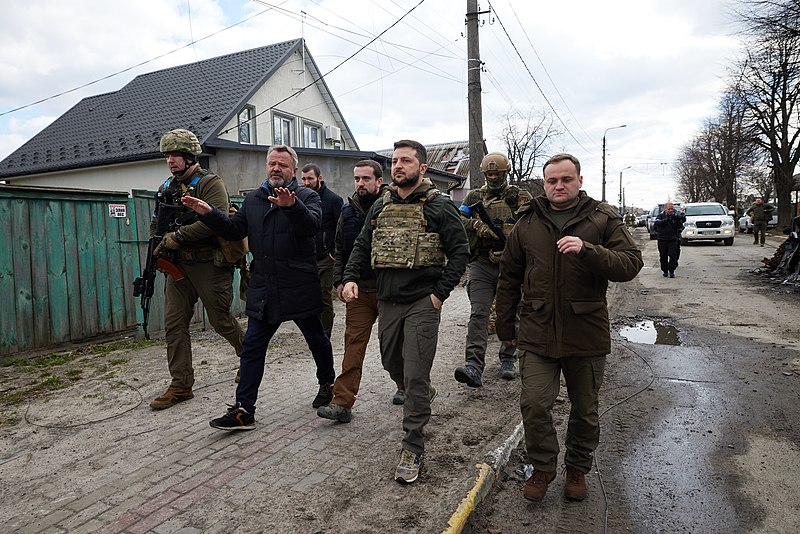Russia’s invasion of Ukraine has also led to rising prices in food as Ukraine struggles to export its grain to countries in need. Kyiv, along with allied nations, held a conference to launch its initiative to export millions of dollars worth of grain to countries that are at risk of famine and drought.
Ukrainian President Volodymyr Zelenskyy hosted the summit in Kyiv with allied countries Saturday to launch its plan to export $150 million worth of grain to countries that are vulnerable to drought and famine. Zelenskyy said that the initiative was an effort by Kyiv to live up to maintaining global food security.
Zelenskyy said that Kyiv was able to raise around $150 million from over 20 countries, including the European Union, to export grain to countries such as Ethiopia, Sudan, South Sudan, Somalia, and Yemen. In attendance at the summit were the prime ministers of Belgium, Poland, and Lithuania and the president of Hungary. The presidents of Germany, France and the head of the EU’s executive branch addressed the conference through video.
“We plan to send at least 60 vessels from Ukrainian ports to countries that most face the threat of famine and drought,” said Zelenskyy at the summit.
The initiative follows comments from the Kremlin claiming that the grain being exported from Ukraine through the United Nations-brokered deal was not reaching the countries that need it most.
The leaders later issued a joint statement after the summit, saying that since Russia’s invasion on February 24, the world received tens of millions fewer agricultural products than in 2021 around the same time. The statement stressed that food security in the world was threatened due to Russia’s blockade of Ukrainian ports in the early days of the war.
On Sunday, Ukrainian infrastructure minister Oleksandr Kubrakov said that the exports of Ukraine’s grain would not reach three million tons this month as Moscow is trying to limit ship inspections at ports. In a post on his Facebook page, Kubrakov said that around 4.2 million tons of Ukrainian grain left ports in October.
“It was the custom to conduct 40 inspections a day, now, due to Russia’s position, there are five times fewer checks,” said Kubrakov.



 Netanyahu to Meet Trump in Washington as Iran Nuclear Talks Intensify
Netanyahu to Meet Trump in Washington as Iran Nuclear Talks Intensify  U.S. Lawmakers to Review Unredacted Jeffrey Epstein DOJ Files Starting Monday
U.S. Lawmakers to Review Unredacted Jeffrey Epstein DOJ Files Starting Monday  Federal Judge Restores Funding for Gateway Rail Tunnel Project
Federal Judge Restores Funding for Gateway Rail Tunnel Project  Antonio José Seguro Poised for Landslide Win in Portugal Presidential Runoff
Antonio José Seguro Poised for Landslide Win in Portugal Presidential Runoff  Israel Approves West Bank Measures Expanding Settler Land Access
Israel Approves West Bank Measures Expanding Settler Land Access  India–U.S. Interim Trade Pact Cuts Auto Tariffs but Leaves Tesla Out
India–U.S. Interim Trade Pact Cuts Auto Tariffs but Leaves Tesla Out  Nicaragua Ends Visa-Free Entry for Cubans, Disrupting Key Migration Route to the U.S.
Nicaragua Ends Visa-Free Entry for Cubans, Disrupting Key Migration Route to the U.S.  Taiwan Says Moving 40% of Semiconductor Production to the U.S. Is Impossible
Taiwan Says Moving 40% of Semiconductor Production to the U.S. Is Impossible  Anutin’s Bhumjaithai Party Wins Thai Election, Signals Shift Toward Political Stability
Anutin’s Bhumjaithai Party Wins Thai Election, Signals Shift Toward Political Stability  Trump’s Inflation Claims Clash With Voters’ Cost-of-Living Reality
Trump’s Inflation Claims Clash With Voters’ Cost-of-Living Reality  Trump Says “Very Good Talks” Underway on Russia-Ukraine War as Peace Efforts Continue
Trump Says “Very Good Talks” Underway on Russia-Ukraine War as Peace Efforts Continue  China Warns US Arms Sales to Taiwan Could Disrupt Trump’s Planned Visit
China Warns US Arms Sales to Taiwan Could Disrupt Trump’s Planned Visit  Trump Allows Commercial Fishing in Protected New England Waters
Trump Allows Commercial Fishing in Protected New England Waters  Ghislaine Maxwell to Invoke Fifth Amendment at House Oversight Committee Deposition
Ghislaine Maxwell to Invoke Fifth Amendment at House Oversight Committee Deposition  Jack Lang Resigns as Head of Arab World Institute Amid Epstein Controversy
Jack Lang Resigns as Head of Arab World Institute Amid Epstein Controversy  China Overturns Death Sentence of Canadian Robert Schellenberg, Signaling Thaw in Canada-China Relations
China Overturns Death Sentence of Canadian Robert Schellenberg, Signaling Thaw in Canada-China Relations  Japan Election 2026: Sanae Takaichi Poised for Landslide Win Despite Record Snowfall
Japan Election 2026: Sanae Takaichi Poised for Landslide Win Despite Record Snowfall 































